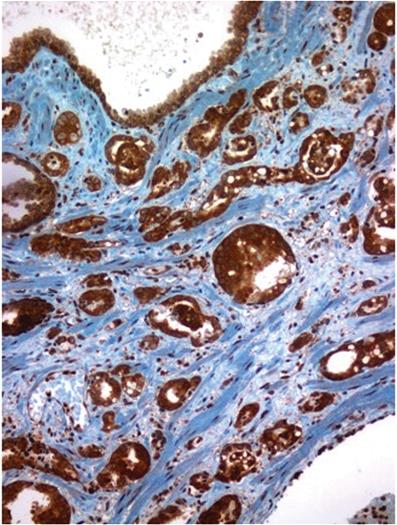
Metastatic castration-resistant prostate cancer (mCRPC) patients are now one step closer to more personalized treatment, thanks to a new test that can distinguish who will respond well to standard therapies and who will become resistant to treatment.
The simple blood test uses plasma circulating tumour DNA (ctDNA) to identify genetic markers that can indicate if a patient is either currently -- or likely to become -- resistant to widely-used treatments. Defects in BRCA2 and ATM were strongly linked to poor clinical outcomes in patients receiving standard therapy regimes, and somatic alterations in TP53 were also independently associated with tumour resistance.
The present study was led by Drs. Kim Chi, Alexander Wyatt and Martin Gleave (Vancouver Prostate Centre), and results were published in Cancer Discovery (January 2018). Around 30 per cent of patients with advanced metastatic cancer do not respond to standard treatments. This test is the first of its kind to offer hope to these patients, allowing physicians to direct this demographic to alternative treatments or therapy intensification (combination approaches) that may be more effective in treating their metastatic disease.
The paper builds on the team’s foundational June 2017 discovery (published in JNCI), which determined that plasma ctDNA was indeed accurately representative of metastatic prostate cancer biopsies. Prior to this discovery, the only method of collecting samples of metastases in advanced prostate cancer was by taking a biopsy of the bone, the most common location for tumour spread in this disease. This invasive procedure hindered the collection of metastases, and made developing more personalized patient management difficult.
For the JNCI paper, researchers performed targeted sequencing across 72 clinically relevant genes in ctDNA samples from 45 different patients. The results showed that all somatic mutations identified in matched metastatic tissue biopsies were also present in ctDNA, suggesting that blood-based profiling is sufficient to guide mCRPC patient management.
Study: Concordance of Circulating Tumor DNA and Matched Metastatic Tissue Biopsy in Prostate Cancer
Authors: Alexander W. Wyatt, Matti Annala, Rahul Aggarwal, Kevin Beja, Felix Feng, Jack Youngren, Adam Foye, Paul Lloyd, Matti Nykter, Tomasz M. Beer, Joshi J. Alumkal, George V. Thomas, Robert E. Reiter, Matthew B. Rettig, Christopher P. Evans, Allen C. Gao, Kim N. Chi, Eric J. Small, Martin E. Gleave
Study: Circulating Tumor DNA Genomics Correlate with Resistance to Abiraterone and Enzalutamide in Prostate Cancer
Authors: Matti Annala, Gillian Vandekerkhove, Daniel Khalaf, Sinja Taavitsainen, Kevin Beja, Evan W. Warner, Katherine Sunderland, Christian Kollmannsberger, Bernhard J. Eigl, Daygen Finch, Conrad D. Oja, Joanna Vergidis, Muhammad Zulfiqar, Arun A. Azad, Matti Nykter, Martin E. Gleave, Alexander W. Wyatt, and Kim N. Chi
Funding: Both studies were funded in part by a Terry Fox New Frontiers Program Project grant from The Terry Fox Research Institute.
Links #6